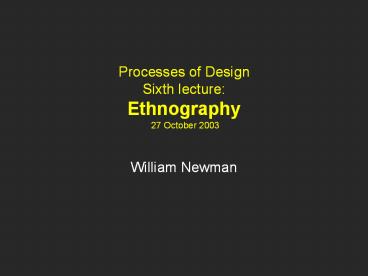Processes of Design Sixth lecture: Ethnography 27 October 2003 - PowerPoint PPT Presentation
Title:
Processes of Design Sixth lecture: Ethnography 27 October 2003
Description:
Generalizing therefore falls on the designer ... Ethnographer relates findings to designers. Designers come back with questions ... – PowerPoint PPT presentation
Number of Views:56
Avg rating:3.0/5.0
Title: Processes of Design Sixth lecture: Ethnography 27 October 2003
1
Processes of DesignSixth lectureEthnography
27 October 2003
- William Newman
2
Evaluation Revisiting the Problem
- We must simulate the end result
- We have particular problems
- Simulating the user
- Simulating the context
- Simulating how the user performs the task
- Ethnography helps us understand these better
- This is my view of the What and How of
Ethnography.
3
What Is Ethnography?
- Fieldwork methods for the study and analysis of
social settings - Draws on methods used in studies of primates and
primitive tribes
- A research activity, increasing our knowledge of
the social world - Links with philosophy rather than scientific
theory.
4
How Computer Research discovered Ethnography
- Jeff Rulifsons Office Research Group at Xerox
PARC - Recruiting anthropologists to study office
workers - Advanced Systems Dept (1978-80) Altos in the
White House - Lucy Suchman and Situated Action.
5
Work Practice and Technology Research at PARC
1980-2000
- Practical ethnography and design participation
- San Jose Airport studyThe Flight Tracker example
- Orrs study of service techniciansWar stories
as teaching materials - The Denver ProjectConnecting service techs by
radio - Ethnographic studies continue at PARC (Jack and
Marilyn Whalen).
6
Ethnography in Europe
- Wes Sharrock (Manchester Univ.)
- Lancaster Univ.s Sociology Dept.
- Scandinavian participative design research
(Susanne Bodker) - Xerox Cambridge from pure HCI to Sociology and
Ethnography (Richard Harper) - The Xerox IMF study.
7
Responsibility Modelling
- Why are systems accepted by their users, and
other rejected? - Rejection of an air traffic control workstation
- IMF Economic Database failure
- Question What matters most to workers?
- Hypothesis Whatever makes them effective team
members, and reduces the risk of being fired. - I.e. meeting their responsibilities
- But is it valid to make predictions based on
studies of social behaviour?
8
Ethnomethodology (EMy)
- A long word about studying small-scale social
action - Concerned with everyday socialaction and its
production of order - Origins in Conversation Analysis
- Examples
- Gaze and speech interruption
- Patients design of pain cries
- The 10-second free turn in medical consultations.
9
EMys limitations
- Looks at fine detail -- influences only the file
detail (UI) of design - Invalidity of generalizing about social action
- Generalizing therefore falls on the designer
- EMists dont build on each others work -- they
prefer to demolish it! - So theres work to be done.
10
Summary Ethnographic study methods
- Direct observation
- Interview
- Video and/or audio recording
- Diary-keeping
- Also participation and action research
11
Informing design
- The correct approach
- Ethnographer conducts studies
- Ethnographer relates findings to designers
- Designers come back with questions
- Ethnographer does further studies, etc.
- The field usability testing approach
- Ship the product or prototype
- Find a study site
- Gather data about design faults, report back
- Can we do better?
- The diary study option.
12
(No Transcript)































